
(Photos J.Maus/BikePortland)
Part of our series of guest posts, America’s Next Bicycle Capital, where we share community voices about the future of biking in Portland.
This week’s guest writer is Kirk Paulsen (@PedalPortland), a traffic analyst for Lancaster Engineering.
If Portland is going to actually build its planned bike network, more people need to show up to neighborhood meetings to demand change. It’s unfortunate that this is the case, but it is.
But here’s the problem: this request from the city to active transportation advocates happens over and over again, with little increase in the number of people showing up. And this is Portland where, already, many more people are actively involved in transportation advocacy than in most any other place in the country.
Why aren’t even more people showing up to the meetings? This is my personal experience with why more aren’t.
At the beginning of getting involved in the 20s Bikeway project, I was completely stoked to see that the list of stakeholder advisory committee members was overwhelmingly bike-friendly. I was certain that this project would result in something awesome for the future of our city. Long story short: it likely won’t.
I started the process really excited and wanting to find ways to get more involved. I started attending my neighborhood land use and transportation committee meetings. I also attended some Northeast Coalition of Neighborhoods meetings related to the project. At the end of the project, I realized that it takes a LOT of time/energy to get a simple compromise out of the deal.
Advertisement
I’m a wonk about this stuff. I love transportation and what we could change about it. But the process honestly tired me out to attend all of these meetings. But I stuck with it.
If I, somebody who thinks about transportation every single day, still walked away from the process feeling stressed about a watered-down compromise at a time when we need to start making bold changes, how the hell are we supposed to expect regular folks to attend such wonky meetings? They may live within that specific neighborhood, and may enjoy moving about actively and sustainably, but have other legitimate passions that take up their free time.
If we want more people to attend these type of meetings, we need to give them something that inspires them, gives them some form of hope, some form of feeling that their opinion is valued. I don’t see that right now.
When our neighborhood land use and transportation committee met with PBOT to demand diverters in the northern section of the 20s Bikeway route, we were given every reason why diverters couldn’t be installed except one: that we didn’t have enough neighborhood support behind it.
“If our city truly yearns for more people who care about active transportation to come to neighborhood meetings… someone needs to offer some plans worth cheering for.”
It’s as if it is a game of whack-a-mole: you show up online and demand change but you aren’t “real” enough, and are encouraged to show up to neighborhood meetings. So you take time out of your day to show up to neighborhood meetings to demand change, but there isn’t enough money. So you show up to stakeholder advisory committee meetings to advise PBOT how to use their couple million dollars specifically for a bike project in a certain way, but there isn’t enough support from businesses.
How again do we inspire people to attend all of these meetings?
Now that I’ve been introduced to the neighborhood land use and transportation committee I’ll be back at future meetings for sure. Not to expect great changes, but to make sure that a compromise for any project can at least be possible when the time comes.
But as I learned working on the 20s Bikeway, a small group of people like me is not enough. If our city truly yearns for more people who care about active transportation to come to neighborhood meetings and cheer a plan along, someone needs to offer some plans worth cheering for.
If you’d like to add your voice to this series, get in touch via email: michael@bikeportland.org.



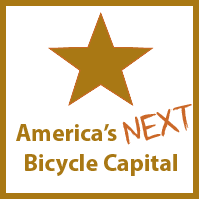
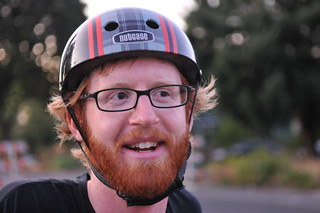
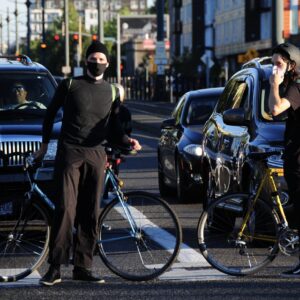
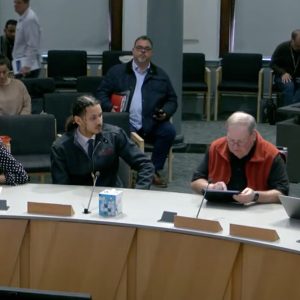
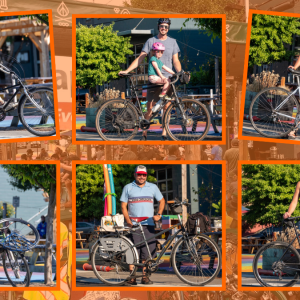
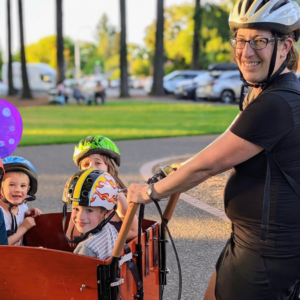
Thanks for reading.
BikePortland has served this community with independent community journalism since 2005. We rely on subscriptions from readers like you to survive. Your financial support is vital in keeping this valuable resource alive and well.
Please subscribe today to strengthen and expand our work.
such a great point… why continue showing up and giving support to active transportation when the city is just going to ignore you and cave to the status quo?
I’m dealing with it right now in an email chain with the city… I’m demanding enforcement, but they tell me they can’t be bothered to defend the law in court when people contest their ticket…
where’s my motivation? why should I care when the city doesn’t?
Wow. The whack-a-mole idea is a very sobering and saddening way of putting things.
Can’t I just place my vote for better infrastructure through the obvious, public action of biking everywhere? There is nothing in the world I want to do less than attend these meetings. But duh, I want better bike lanes and greenways and paths and everything.
I understand that we need some dedicated citizens to put the obvious (25 bikes stopped together at the light at 20th and Division every morning at 8am) into words, but it ain’t me.
I am so frustrated by this all… Isn’t this why we vote? To elect leaders that can represent our interests and get stuff done because who the heck has time (especially during our precious summer months) to go to meetings. I got to meetings all day at work, and in general, they suck. Arghghghg.
No. It’s not enough to vote. All you have to do is go on the O-live website and look at all the hater comments. They’ll continue to tell you that 80+ percent of the people are “voting by driving their cars.” And some of those people are most likely the leaders of your neighborhood group!
I served on the city bicycle committee of another city for several years and we were constantly begging other cyclists for support at planning commission and city council meetings.
Kirk’s comments are right on. Cyclists have to become involved in the mainstream activities – neighborhood meetings and committees, budget hearings, etc.
I did notice that lots of cyclists showed up at the Portland street fee meetings, but we must do more to move ahead.
Kirk,
Thanks for the kick in the a**. I added Sullivan Gulch Neighborhood Assoc meeting to my calendar.
Yay!!! That’s awesome.
IMO, the City does not conduct their meetings in good faith. I attended many of the NP Greenway meetings, and I have ben involved in a bunch of other transportation meetings. Each time I gave verbal commentary, I submitted written comments, I placed sticky notes on plans and I submitted on-line comments when possible. However, in the meeting notes that are occasionally published, or at subsequent meetings, my comments are not included, and are in fact ignored! I recognize that the City has limited time and patience for these projects, but it is completely demoralizing for them to pretend to be listening/taking comments when in fact they have a pre-determined set of options they will even consider. The City needs to be much more up-front with the public about they are going to do, and which minor aspects of a given plan they are open to tweaking. Or come up with anew, inclusive process that allows comments to be considered when making decisions.
In my opinion, this is where Critical Mass could come into play. When the city fails to listen we need to make it clear that we will not be ignored.
Additionally, as our bike infrastructure reaches capacity and becomes congested – especially during peak hours – we need to start taking the lane on the arterials when it’s not insanely dangerous to do so. Perhaps when motorists are frustrated by swarms of bikes in their lane they will demand that the city provide separated infrastructure for the benefit of everyone. At least it will get a proper discussion going…
For any movement, only a tiny subset of people will take the time to be active advocates for the movement. It’s not a fixed percentage; some views may be widely-held but without much fervor, and some views may attract a small but passionate following.
It seems to me that cycling advocates are pretty darn passionate, and pretty well organized. There’s just a lot more people who don’t ride than who do. It’s possible that the city has found its equilibrium as to how it supports its drivers vs. its riders.
I don’t think Portland’s bike infrastructure is done. Certainly there are particular streets or intersections that could use improvement. But much of the low-hanging fruit has been plucked. Once you start contemplating separated infrastructure and lane repurposing, the cost (and opportunity cost) skyrockets.
I’m not a fan of Critical Mass. I’m in the camp that says that Critical Mass stigmatizes cyclists in the eyes of Portland’s citizenry, to the detriment of advocates’ aims.
Increasingly, I’m starting to wonder if all the appeals to “show up” from PBOT should be interpreted as a cry for help. The bureau has operated from a position of “first, do no harm” for too long now, and it’s gotten worse and worse as the street fee discussions have heated. As a result, progress has slowed to a pace that I’d call glacial if not for the fact that the glaciers are, you know, actually receding at a measurable (read: scary fast) pace while we twiddle our thumbs. This near-complete halting of forward progress has got to be frustrating to the folks who are invested in building our bike infrastructure and have historically performed well. Could it be that their energy and ideas are being stifled by leadership, and they’re appealing to us, the citizenry, to help convince the bosses that they’re right. I’m purely speculating, but it’s one possible explanation.
I can’t help but come back to the fact that the Council currently has no member who relies on biking or walking to access the city, and is largely uniform regarding other demographic considerations as well. I would love–LOVE–to see a strong, electable, unapologetically pro-bike candidate (perhaps even–gasp!–a millennial) vie for a seat in the next election. There are a few years to make it happen…
Yes. Those are a cry for help from the staff.
I served for several years on a bicycle committee in another city. We begged other cyclists to show up at planning commission meetings and city council meetings. The elected officials were always courteous, but they needed to know there were more than eight members of the bicycle committee.
“I would love–LOVE–to see a strong, electable, unapologetically pro-bike candidate (perhaps even–gasp!–a millennial) vie for a seat in the next election.”
Didn’t just see exactly that in the last council election? That candidate didn’t do too well.
“When our neighborhood land use and transportation committee met with PBOT to demand diverters in the northern section of the 20s Bikeway route, we were given every reason why diverters couldn’t be installed except one: that we didn’t have enough neighborhood support behind it.”
Rich, I know you can read this….why did you tell me that diverters would add a “DIVISIVE ELEMENT” to the conversation when in NE they want them?
Does PBOT not think we would compare notes?
This is the BEST grid pattern of street in the city. This is not a cul-de-sac system like East Portland, this is not the Tualatin mountains, this is close to a perfect grid. If you can not do them here, then where?
“cave to the status quo?”
Surveys show that voters in Portland rate street safety and active transport infrastructure very highly. This is the status quo! Hales, Novick and company are not caving to the status quo they are caving to business influence/corruption.
Personally I quite participating in the public process after seeing diminishing returns for cyclists on most PBOT transportation projects over the course of 12 years on the Portland Bicycle Advisory Committee.
The Hawthorne Blvd. Transportation Planning process was even worse, I spent several years in the late 90s and early 00s attending advisory committee and other meetings and, even after quite a bit of demonstrated participation and support from the cycling ‘community’ for changes on Hawthorne Blvd., the results were completely disappointing.
And I imagine that anyone who spent the time to participate on other specific PBOT advisory committees, such as N. Williams or E. 28th, probably feels the same way…
Thank you, Kirk. What an excellent article!
It’s true: it’s exhausting with little inspiration to keep people going. I, too, was super involved and active in organizing others to get involved (and I was able to get a ton of people that weren’t “cyclists” to show up to anti-CRC gatherings and fundraisers & some other issues, too), but as these things drag on with little hope for designs that legitimately moves us towards a better, safer, more inclusive transportation system, people get tired. They get tired, they get burnt out, and by the 30th town hall or hearing they just stop responding.
It’s not lack of commitment, it’s lack of signs that what they’re doing is making any difference. There’s a real sense of defeat among the people I speak to: they’re upset about it, but they realize after trying time and time again to speak out that their voice carries nearly no weight in comparison to larger interests.
I believe we can change this, and I think it starts with inspirational designs – individual projects that people can get behind, one at a time, to change our understanding of what kind of streets are possible. Not trying to fight for an inch more space in a pre-existing, mediocre plan – but presenting entire concepts independent of the city.
If anyone would like to bounce around some ideas, I’m happy to be a part of it. Maybe a happy hour sometime soon…
I believe we can change this, and I think it starts with inspirational designs – individual projects that people can get behind
This is not a design competition, it’s an ugly political *fight* over transportation dollars. And IMO portland bike advocates have been ODing on “inspiration” for years.
Inspiration.
Stakeholder committee.
Learned Helplessness.
Does this cycle sound familiar?
I believe we can change this, and I think it starts with confrontation of those who are willing to prioritized private profits over building a better and safer community.
To each their own. If confrontation and pushing back is your preferred method – go for it. We need everyone involved in moving our streets forward.
Inspiration, rallying for something rather than constant opposition, and creating the narrative rather than responding make me want to stay involved, so I’ll stick with those.
“rallying for something”
imo, the city council and pbot have played this attitude like a fiddle. stakeholders are united that they don’t want “A”. bike advocates are divided over whether they want V, W, X,Y, or Z.
divide and conquer.
imo, it’s time to stop participating in the corrupt stakeholder process. it’s also time for cyclists to unite around multiple options — not just one “inspirational” one.
those people don’t care about anything but themselves and confronting them results in them laughing in your face as they use their political power to steamroller you…
we need politicians with guts, but those are opposing traits…
i agree. if a candidate does not *actively* support an active transport agenda we should not just roll over and beg for scraps. campaign against them and/or support someone better.
Cheers to you Lisa Marie. It’s comforting reading about others being exhausted by the process as well. Wish it wasn’t that way, but glad I’m not alone.
Happy hour to connect with others and reconnect with friends is always a good idea, mark me down.
Ditto.
I am in the unique position of owning a business that does 99.5% of its business by bicycle, and I like to make it to the PBOT meetings, etc. I think bringing in my perspective is needed, as it seems that PBOT will cave in to the business owners whims, wishes, or demands. That said, at the end of the day, after working on the south on the sunny south side of a house, or in a relentless rain shower, it is difficult to turn around and head to a meeting. Oftentimes, my first thoughts after I get home are to unload the trailer, relax, and eat. To turn around after a long day, and bike to a meeting can be taxing, and make for a full day. I would like to be more committed to the cause, and I try, but man, it is hard. Props to all those who make it out after a full day of work!
While I was reading this article my calendar alert went off and now I’m drinking a cider outside the locked door of the Kennedy School community room. If this counts as quorum for the Concordia Neighborhood Association meeting than I just voted to instate a no passing bikes rule for cars on our Greenways and to run the 20s bike route past my door.
More likely my calendar is wrong or there’s some listserv that I should be watching for holiday announcements.
Well, personally I’ve gone to a couple meetings. But working full time and having family responsibilities make those things difficult.
Honestly, most of them aren’t announced in advance enough that gives you time to plan on attending.
And 99% of the meeting are weekdays during business hours when most people with jobs and families are busy doing their work or needing to the get the kids from school and preparing dinner, etc. Of course the other 1% are usually Downtown and start at 5pm -6pm (wonk happy hour), just as people are getting off work and cooking dinner for their families. And then you gotta deal with heading downtown during rush hour if your one of the 60-70% of Portlanders that don’t work Downtown.
And honestly, I think they do it on purpose for two reasons. First no one wants to work funky hours, and I don’t blame them, I hate working long shifts and odd days, but I do it when I have to. It’s my job.
Second – I don’t think they actually want that many people there. I gave up on the 20s project at a pre-meeting when it became clear that basically the project through the heavily disputed 28th segment was mostly at the mercy of one of the predominate landowners on 28th, and the few staffers that were there after my late arrival (see the above paragraphs) made the meeting with that person the next day sound pretty hopeless. And they knew the whole time it wasn’t going to work through 28th. Since the day it was announced, they had alternative paths already plotted out.
And honestly, I don’t believe many there (ODOT or PDOT) really care that much about bikes. They care about resumes. And bikes lanes, curb bump outs, and road diets are the “in” fashion right now. And being lead on a project in Portland is defiantly resume builder.
Many are just like professional sport players, their loyalty to the community they serve is only as deep as the paycheck goes, and they’ll gladly drop a community in favor of a bigger pay check elsewhere. I doubt many wouldn’t go to DC or NYC or any other larger city if given the chance.
And don’t think I’m condemning them for that either, it’s a capitalist society and that’s how it is. Someone offers me more money for what I already do I’m all over it, two weeks turned in….As long as it’s in Portland. And that is the difference.
The advocates aren’t leaving, and are the ones who care AND have to live with what the staffers leave behind. The advocates are the ones with families and jobs that need tending to. If they want to hear from people that have more than one dog in the race, those agencies need to try schedule around them. I work too hard, and loose too much money taking a day or afternoon off to attend a public meeting.
Gutter, I hear a lot of your issues. And I agree that daytime meetings are kind of silly. The projects I’ve been sitting in on though (82nd Ave, Foster, etc.) have all been easier to attend, they usually meet at 6-7 PM and usually somewhere related to the project (like off 82nd or Foster). Our NA usually only meets once a month from 7-9 in our neighborhood.
So there are some meetings that happen around where we live, and at slightly more convenient times.
I completely agree that I think PBOT does an awful job with publicizing events. Why can’t they just get a few moveable signs that they can actually put on the road where people who use the road would see it?
After working on this issue for more than 30 years, I will force myself to begin by saying that incredible progress HAS been made. As of 1990, there were some 3 miles of bike facilities in Portland (the 1-205 bike path built by ODOT). After attending 10 years of meetings and seeing nothing happen, I helped start the Bicycle Transportation Alliance. We did what any other grassroots, volunteer group does to move an agenda: we agitated, demonstrated, had postcard campaigns, and worked directly with elected officials, using the currency they understood–numbers.
It is both sad and discouraging to read this and other comment threads and the BTA is not ever mentioned. The wins we have in Portland came directly from the BTA creating a unified voice. Now, despite having great pro-bike policies, staff will not implement because they don’t have the backing of their bosses–the City Council–and the City Council won’t be bold without being pushed.
I did my share of showing up at meetings, and it DOES help to be there. But when City staff say they won’t implement adopted policy (see discussion on Clinton Street traffic woes elsewhere on Bike Portland) unless the neighbors want it implemented, they are telling you that they aren’t going to risk it because their bosses don’t have their backs.
Its time for the BTA to return to its roots, or step aside.
BTA 1992:
We did what any other grassroots, volunteer group does to move an agenda: we agitated, demonstrated, had postcard campaigns, and worked directly with elected officials, using the currency they understood–numbers.
BTA 2014:
We are currently working with local businesses and neighbors to better understand Broadway’s needs and to discuss potential solutions.
The Bicycle Transportation Alliance is working with civic, business, and elected leaders to build support for new protected bike lanes downtown.
I’ve been getting around by bike in Portland since about 1991, and what existed at that time was a nightmare, total nightmare. I am grateful to the folks who put in the hours to build out what Portland has for infrastructure now. It’s far safer than it used to be… albeit, it could/should be safer.
There does need to be an advocacy group willing to make some waves with City Council and PBOT. The N Williams plan got watered down. IMO the current plan will potentially make things better, but it could have been great, a catalyst project, something that other areas of the city (Alberta, 28th, Hawthorne, Division) might have adopted after seeing the success of N Williams.
Gutter bunny said it pretty well up above. My 2 cents, been to a few meetings, for the most part seems meetings are held to sell you on decisions that are already made. For the most part it’s like arguing with an umpire after he’s made the call, if you argue hard enough you may effect future calls but for now he won’t back down.